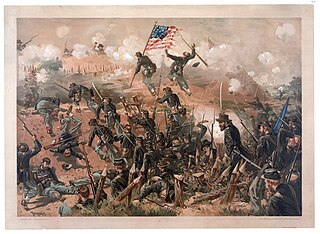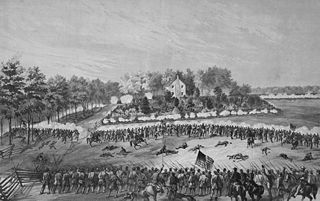The Battle of Jackson occurred at Jackson, Mississippi, on May 14, 1863, as part of the Vicksburg campaign of the American Civil War
Battle of Jackson may also refer to:
Vicksburg most commonly refers to:

The Siege of Vicksburg was the final major military action in the Vicksburg campaign of the American Civil War. In a series of maneuvers, Union Major General Ulysses S. Grant and his Army of the Tennessee crossed the Mississippi River and drove the Confederate Army of Mississippi, led by Lieutenant General John C. Pemberton, into the defensive lines surrounding the fortress city of Vicksburg, Mississippi, leading to the successful siege and Confederate surrender.

The Vicksburg campaign was a series of maneuvers and battles in the Western Theater of the American Civil War directed against Vicksburg, Mississippi, a fortress city that dominated the last Confederate-controlled section of the Mississippi River. The Union Army of the Tennessee under Major General Ulysses S. Grant gained control of the river by capturing this stronghold and defeating Lieutenant General John C. Pemberton's forces stationed there.

John Clifford Pemberton was a career United States Army officer who fought in the Seminole Wars and with distinction during the Mexican–American War. He resigned his commission to serve as a Confederate lieutenant-general during the American Civil War. He led the Army of Mississippi from December 1862 to July 1863 and was the commanding officer during the Confederate surrender at the Siege of Vicksburg.

There is widespread disagreement among historians about the turning point of the American Civil War. A turning point in this context is an event that occurred during the conflict after which most modern scholars would agree that the eventual outcome was inevitable. The near simultaneous Battle of Gettysburg in the east and fall of Vicksburg in the west, in July 1863 is widely cited as the military climax of the American Civil War. Several other decisive battles and events throughout the war have been proposed as turning points. The events are presented here in chronological order with only the positive arguments for each given.

The Battle of Jackson was fought on May 14, 1863, in Jackson, Mississippi, as part of the Vicksburg campaign during the American Civil War. After entering the state of Mississippi in late April 1863, Major General Ulysses S. Grant of the Union Army moved his force inland to strike at the strategic Mississippi River town of Vicksburg, Mississippi. The Battle of Raymond, which was fought on May 12, convinced Grant that General Joseph E. Johnston's Confederate army was too strong to be safely bypassed, so he sent two corps, under major generals James B. McPherson and William T. Sherman, to capture Johnston's position at Jackson. Johnston did not believe the city was defensible and began withdrawing. Brigadier General John Gregg was tasked with commanding the Confederate rear guard, which fought Sherman's and McPherson's men at Jackson on May 14 before withdrawing. After taking the city, Union troops destroyed economic and military infrastructure and also plundered civilians' homes. Grant then moved against Vicksburg, which he placed under siege on May 18 and captured on July 4. Despite being reinforced, Johnston made only a weak effort to save the Vicksburg garrison, and was driven out of Jackson a second time in mid-July.

The Battle of Champion Hill of May 16, 1863, was the pivotal battle in the Vicksburg Campaign of the American Civil War (1861–1865). Union Army commander Major General Ulysses S. Grant and the Army of the Tennessee pursued the retreating Confederate States Army under Lieutenant General John C. Pemberton and defeated it twenty miles to the east of Vicksburg, Mississippi, leading inevitably to the Siege of Vicksburg and surrender. The battle is also known as Baker's Creek.

Vicksburg National Military Park preserves the site of the American Civil War Battle of Vicksburg, waged from March 29 to July 4, 1863. The park, located in Vicksburg, Mississippi, also commemorates the greater Vicksburg Campaign which led up to the battle. Reconstructed forts and trenches evoke memories of the 47-day siege that ended in the surrender of the city. Victory here and at Port Hudson, farther south in Louisiana, gave the Union control of the Mississippi River.

The Battle of Raymond was fought on May 12, 1863, near Raymond, Mississippi, during the Vicksburg campaign of the American Civil War. Initial Union attempts to capture the strategically important Mississippi River city of Vicksburg failed. Beginning in late April 1863, Union Major General Ulysses S. Grant led another try. After crossing the river into Mississippi and winning the Battle of Port Gibson, Grant began moving east, intending to turn back west and attack Vicksburg. A portion of Grant's army consisting of Major General James B. McPherson's 10,000 to 12,000-man XVII Corps moved northeast towards Raymond. The Confederate commander of Vicksburg, Lieutenant General John C. Pemberton, ordered Brigadier General John Gregg and his 3,000 to 4,000-strong brigade from Jackson to Raymond.

Mississippi was the second southern state to declare its secession from the United States, doing so on January 9, 1861. It joined with six other southern states to form the Confederacy on February 4, 1861. Mississippi's location along the lengthy Mississippi River made it strategically important to both the Union and the Confederacy; dozens of battles were fought in the state as armies repeatedly clashed near key towns and transportation nodes.

The 4th Minnesota Infantry Regiment was a Minnesota USV infantry regiment that served in the Union Army during the American Civil War. It served in several important campaigns in the Western Theater.
7th Ohio Battery was an artillery battery that served in the Union Army during the American Civil War.

George Boardman Boomer was a Union Army colonel who served as a brigade commander between February 12, 1863, and May 22, 1863, during the American Civil War. His principal service was during the heavy engagement of his brigade on May 16, 1863, at the Battle of Champion Hill during the Vicksburg campaign and in the second assault on Vicksburg on May 22, 1863. Colonel Boomer was killed near the Railroad Redoubt on the second day of major assaults on the City of Vicksburg on May 22, 1863.
The Jackson expedition, preceding and related to the siege of Jackson immediately followed the Confederate surrender of Vicksburg, Mississippi on July 4, 1863 to Union Army Major General Ulysses S. Grant commanding the Union Army of the Tennessee. The Confederate Army of Mississippi at Vicksburg, under the command of Lieutenant General John C. Pemberton, had been isolated in the Vicksburg defenses by Grant's forces since May 18, 1863. The Confederates were under constant artillery bombardment, had to fight off a series of Union Army attacks and could not receive supplies of food and ammunition during the siege.
The 47th Regiment Indiana Infantry was an infantry regiment that served in the Union Army during the American Civil War.
Battery L, 2nd Illinois Light Artillery Regiment was an artillery battery that served in the Union Army during the American Civil War. It was also referred to as Bolton's Battery, Hulaniski's Battery, and Nichols' Battery. The battery fought at Shiloh, Corinth, Hatchie's Bridge, Port Gibson, Raymond, Jackson, Champion Hill, Vicksburg, and Yazoo City. The unit mustered out in August 1865.
The 16th Regiment Indiana Infantry was an infantry regiment in the Union Army during the American Civil War. In August 1863, the regiment was converted to mounted infantry for the remainder of the war.
The 1st Indiana Light Artillery Battery was an artillery battery from Indiana that served in the Union Army between August 5, 1861, and August 22, 1865, during the American Civil War.

6th Indiana Battery Light Artillery was an artillery battery that served in the Union Army during the American Civil War.
9th Indiana Battery Light Artillery was an artillery battery that served in the Union Army during the American Civil War.